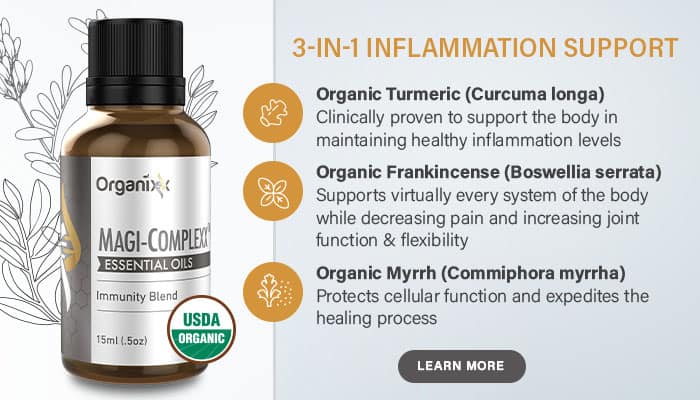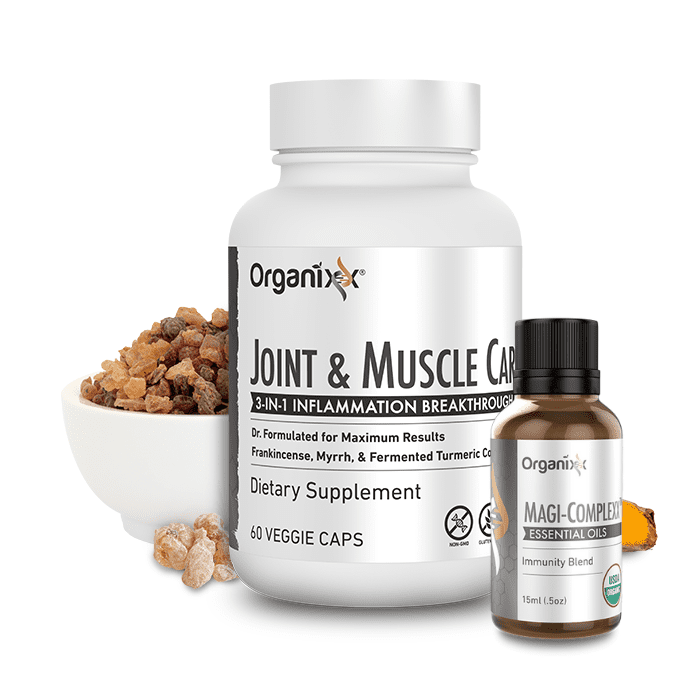Empowering You Organically – Season 5 – Episode 33
Title: Top 6 Organic Essential Oils and their Do’s & Don’ts
Hosts: Jonathan Hunsaker & TeriAnn Trevenen
Guest: None
Description: Join us for a dive into the power of essential oils in our daily lives. The interest in essential oils is rapidly on the rise according to Google Trends. The trend line is fascinating. Why? What makes essential oils so sought after? They work! Organixx carries a line of organic and pure essential oils. Today we will share the top 3 uses of the top single essential oils in our line.
* * *
FEATURED PRODUCT
This Powerful Anti-Inflammatory Supports a Healthy Heart, Boosts the Thyroid, and Promotes Brain Function
- 3 NATURAL INFLAMMATORY SUPPORT AGENTS:Our revolutionary formula combines Frankincense, Myrrh & organic fermented Turmeric into a powerhouse anti-inflammatory supplement.
- SOOTHE ACHING JOINTS: Each of these ancient treasures has been shown through studies to help alleviate joint pain, soothe aching joints and decrease inflammation.
- INCREASE MEMORY & ALERTNESS:Frankincense has been scientifically demonstrated to support a healthy heart, support normal thyroid function, and promote memory and brain function.
- CLEAN INGREDIENTS:We use only the purest and cleanest ingredients. Our Joint & Muscle Care contains all natural ingredients free from fillers, binders and excipients.
* * *
Lavender
Lavender oil is believed to have antiseptic and anti-inflammatory properties. We’ve all heard by now that lavender promotes deeper sleep, but did you know…
- There’s promising research for breast health too. 2014 Iranian research published in the journal Nutrition and Cancer found that lavender oil kills breast cancer cells but leaves healthy cells unharmed. It’s important to note that this study was on cells in a petri dish, not on humans. The researchers concluded that: “L. angustifolia has cytotoxic and apoptotic effects in HeLa and MCF-7 cell lines, and apoptosis is proposed as the possible mechanism of action.”1
- Stops the itch and burn of insect bites. Even fire ants! Put a drop of lavender oil on a bee sting, mosquito, or other bug bites to stop pain, itching, and reduce swelling. Reapply as necessary. Lavender oil works really well for this, especially if applied immediately.
- Use it as a flavor booster. Add a drop of high-quality lavender oil suitable for consumption to brownie batter, chocolate icing, cookie dough, dessert recipes, raw chocolate, or even salad dressings. It’s absolutely delicious.
Is Lavender Oil Safe?
Using diluted lavender oil topically or in aromatherapy is generally considered safe for most adults but may not be recommended for children. Applying pure lavender oil to your skin (especially open wounds) may also cause irritation, so we recommend infusing it with a carrier oil, such as olive oil or coconut oil. Dissolving it in water also works.
Be careful not to rub lavender oil in your eyes and mucous membranes. If this happens, wash it out immediately. Lavender oil may also cause allergic reactions in people with unusually sensitive skin, so do a spot test before using it. Simply apply a drop of lavender oil to your arm and see if any reaction occurs.
The U.S. National Institutes of Health (NIH) also warns against using lavender oil when taking medications like barbiturates, benzodiazepines and chloral hydrate, as it may increase their sedative effects and cause extreme drowsiness and sleepiness.
Tea Tree (Melaleuca)
This versatile oil possesses antibacterial, anti-inflammatory, antiviral, and antifungal properties.
- Due to its potent anti-inflammatory benefits, tea tree oil helps to relieve inflammatory skin conditions, especially eczema and psoriasis. Dilute as necessary and apply to affected area two to three times daily.
- Tea tree oil has long been used as a natural bug repellent by native Australian aboriginal people. Chinese research in 2016 found tea tree to be effective against the cereal weevil, Sitophilus zeamais. The cereal weevil is considered to be an extremely destructive pest to stored cereals all over the world. Tea tree also helps to relieve the pain, itching, and inflammation of insect bites.
- If it’s an extra-hot day and your deodorant has failed, apply again, but this time with a drop or two of tea tree oil to help kill bacteria. Tea tree oil’s potent antibacterial properties are well proven with dozens of research studies.
Is Tea Tree Oil Safe?
The answer is yes, as long as it is applied topically in appropriate doses and NOT swallowed. This oil may irritate your skin, especially if used for the first time. We recommend starting with low concentrations until you figure out your tolerance. Determine if you have an allergy to tea tree oil before using it by doing a skin test — apply a small amount to your inner arm to see if any reaction such as a rash or hives occurs.
The National Center for Complementary and Alternative Medicine (NCCAM) recommends avoiding oxidized oil, which has been exposed to air, because it may help trigger allergies more than fresh tea tree oil. Avoid using undiluted tea tree oil as well and use tea tree oil-infused products instead to reduce your risk of skin irritation.
Lemon
The health benefits of lemon oil can be attributed to its stimulating, calming, astringent, detoxifying, antiseptic, disinfectant and antifungal properties. *Important to note: Lemon essential oil can make your skin more sensitive to sunlight.
- Lemon oil has a balancing effect on the oil glands of the scalp. Massage a drop or two of lemon oil into your scalp before you go to bed at night. Wash it out in the morning. Done over a period of weeks, you will notice much less oily hair. It will make your pillow smell nice and fresh too!
- Diffuse lemon oil to help kill airborne bacteria. Research carried out by Dr. Jean Valnet (co-author of the book The Practice of Aromatherapy: A Classic Compendium of Plant Medicines and Their Healing Properties) shows that diffused lemon oil can rapidly kill off the bacteria that causes meningococcal infections, typhoid fever, staph infections, pneumonia, diphtheria, and tuberculosis.
- Several essential oils are haemostatic, i.e. they help to stop bleeding by speeding up the coagulation of the blood. The most useful of these is oil of Lemon, though Geranium and Rose have similar, though less powerful, effects.
Is Lemon Oil Safe?
It is advisable not to use lemon oil without diluting it first, as it can irritate the skin. It must be used with a carrier oil for direct application to the skin. Effective carrier oils include coconut oil, olive oil, and jojoba oil.
There are findings showing that lemon oil may promote photosensitivity, which increases your sensitivity to the sun and may lead to sunburn and uneven darkening of the skin. We also recommend you avoid applying lemon oil and other citrus oils to your skin when outdoors, as blistering may occur.
People with sensitivities should use essential oils with caution. Reactions can vary from person to person. Some may experience skin reactions, while some may have respiratory problems. Consult your physician first before use. Pregnant women and children should also see a doctor before applying lemon oil.
Peppermint
According to a review conducted by the USDA Human Nutrition Research Center on Aging at Tufts University, peppermint has significant antimicrobial and antiviral activities. It also works as a strong antioxidant, displays anti-tumor actions in lab studies, shows anti-allergenic potential and pain-killing effects helps to relax the gastrointestinal tract and may be chemopreventive.4
Note: Chemoprevention is the use of a medication, vitamin or supplement to stop cancer from happening. This is most often used for people who have a high risk of developing cancer.
- The high menthol content of peppermint makes it great for cooling off during hot flashes. At the first sign of a hot flash developing, place a drop at the back of the neck, at the base of the skull, or on the collarbones. Breathe it in. This has an instant cooling and calming effect.
- Peppermint oil not only relaxes skeletal muscles, it also helps to relax the muscles of the respiratory system. Inhaling the scent of peppermint helps to relieve congestion due to allergies and counteract the effects of pollen. Especially powerful when combined with lavender and lemon to ease seasonal allergies!
- Peppermint oil is superb for helping to relieve indigestion and heartburn. Put just one drop of peppermint oil into a glass of water and drink. It works much more quickly than peppermint tea due to the concentrated nature of peppermint oil. If it’s too strong for you, just dilute it and rub it across the tummy.
Is Peppermint Oil Safe?
Peppermint oil is safe in low amounts in most adults, but it can trigger side effects in people with sensitivities. It is important for the following individuals to either avoid using this essential oil or to use it carefully only with the help of a healthcare professional.
- Pregnant and nursing women — Peppermint oil or other similar products may have emmenagogue and abortifacient effects, so it would be wise not to use peppermint oil without your physician’s approval.
- Infants and children 7 years old and younger — Peppermint oil must not be used undiluted because there isn’t enough information regarding its safety for them.
- Diabetics — Using peppermint oil may raise your risk of low blood sugar levels or hypoglycemia.
- Gastroesophageal reflux disease (GERD) and hiatal hernia patients — Peppermint can relax the sphincter between the stomach and esophagus, and cause acid to move up to the esophagus.
- People with gallbladder problems — Peppermint oil may cause gallbladder inflammation; those diagnosed with gallstones should consult a physician before using peppermint oil.
- People taking antacids — These drugs can cause peppermint oil capsules to break down easily, increasing the risk of heartburn.
Eucalyptus
The healing benefits of Eucalyptus Oil can be attributed to its anti-inflammatory, antispasmodic, decongestant, deodorant, and antiseptic qualities, among other valuable properties.
- Eucalyptus oil is known to be a vasodilator, meaning it dilates, or opens, blood vessels. In 1994, Austrian researchers discovered that eucalyptol, a phytochemical in eucalyptus oil (also known as 1,8-cineol) improved global blood flow to the brain, after only 20 minutes of inhalation.9 A newer study released in 2016 by Korean researchers found that eucalyptol is also able to pass through the blood-brain barrier. This research also found eucalyptol’s high antioxidant and anti-inflammatory properties to be helpful in the management of chronic conditions such as respiratory disease, cardiovascular disease, and degenerative nerve and brain diseases.
- Some studies have shown that several different species of eucalyptus may help to reduce blood sugar levels in mice. Also because eucalyptus is such an excellent vasodilator, the entire body benefits from this increase in blood circulation. To help combat poor blood circulation, dilute eucalyptus oil and massage it into the legs, hands, and feet as needed.
- Eucalyptus oil’s anti-inflammatory, antiseptic, and anti-phlegm properties work very quickly to open congested airways. Make a steam inhalation by boiling two cups of water, pour it into a large bowl, then let it cool for five minutes. Add a drop or two of eucalyptus oil. Then create a tent from a small towel draped over your head. Place your face over the bowl and carefully breathe in the vapor until you get some relief. This should only take a couple of minutes. This is great for bronchitis, head colds, chest colds, and asthma.
Is Eucalyptus Oil Safe?
Essential oils like eucalyptus oil are generally safe to use, but with specific precautions. Before using it, consult a holistic doctor to see if your condition would allow you to do so, and undergo an allergen patch test to check for possible allergic reactions and lower your risk for developing side effects.
In general, adults should not take eucalyptus oil orally except under a doctor’s supervision, and this oil mustn’t be given to children, especially those under 2 years old.
While eucalyptus oil is generally safe when applied to adult skin, refrain from applying the oil, salve or chest rub on the face or nose of a baby because of its potential side effects. Lastly, pregnant and breastfeeding women should also avoid using the oil as evidence is lacking regarding its safety for these groups of women.
Frankincense – The KING of essential oils!
Frankincense essential oil is distilled from the resin of the Boswellia tree that grows in many regions within northern Africa and the Middle East. Oman, Somalia, and Ethiopia are the most prominent suppliers today.
Research shows that the natural plant chemical constituents in frankincense oil stimulate the immune system.2
But it supports so much more…
- Frankincense is a powerful health support for respiratory problems such as asthma, chronic obstructive pulmonary disease, pneumonia, and bronchitis. It even helps when suffering from laryngitis. Diffuse it into the room where you intend to spend some time. For best results, use an ultrasonic cool mist diffuser. Never heat essential oils because heating them diminishes their therapeutic effects.
- Whether your skin is dry and mature or oily and blotched with blemishes, frankincense oil has wonderful balancing qualities. It helps to reduce lines and wrinkles by tightening and toning skin, accelerates the healing of blemishes, skin ulcers and wounds, and stimulates cell regeneration. For anti-aging benefits, put several drops into your favorite night time moisturizer. For acne and blemishes, apply it neat directly on the problem area, unless you have very sensitive skin, then dilute.
- Use frankincense oil to help calm and center the mind, to promote spiritual awareness, and to cultivate a sense of inner peace while meditating. Frankincense contains compounds known as sesquiterpenes which work directly on the limbic system of the brain, the center of memory and emotions. Frankincense is calming, grounding, and centering to the nervous system. Diffuse it into your room, or just inhale directly from the bottle at the start of your meditation.
Is Frankincense Oil Safe?
Yes, frankincense oil is generally safe. Just make sure to undergo an allergen patch test before applying frankincense oil topically to see if you have any sensitivity to this oil.
For some groups of people, frankincense oil isn’t recommended, since it may trigger adverse reactions. If you’re pregnant or nursing, avoid using frankincense oil because it may trigger contractions, prompt menstruation and lead to a miscarriage. As for children, there is very limited information regarding the potential use of this oil for this age group, so if you’re a parent or guardian, do not let them use this oil.
How to Dilute Essential Oils
Although essential oils can be used neat (undiluted) in many cases, it is best (and more economical) to dilute essential oils before applying them to the body. Add a drop or two of your chosen oil to one-half to one teaspoonful of an organic carrier oil such as coconut, almond, hemp, or jojoba.
If using with children or pets, use even less essential oil because their smaller bodies cannot tolerate an adult dose. It’s best to consult a qualified aromatherapist before using essential oils with pets or children.
A Final Word About Quality
Always choose high quality, organic essential oil that has been properly distilled so that its phytochemical content is not compromised. Look for bottles labeled 100% pure oil and beware of cheap oils that may be diluted with potentially toxic chemical ingredients.
In addition to the powerful essential oils we touched on today, Organixx carries 6 more beautiful single oils just as powerful and effective to help you maintain optimal health;
- Orange,
- Grapefruit,
- Oregano,
- Geranium Rose,
- Rosemary,
- and Clove.
Be sure to grab your copy of 12 Top Essential Oils and Their Uses – 60+ tips and ideas on using essential oils for better health, wellness, home and so much more!
* * *
Subscribe to Empowering You Organically
Never miss an episode!
APPLE PODCASTS SPOTIFY GOOGLE PODCASTS
–
Episode 33 – Top 6 Organic Essential Oils and their Do’s & Don’ts





